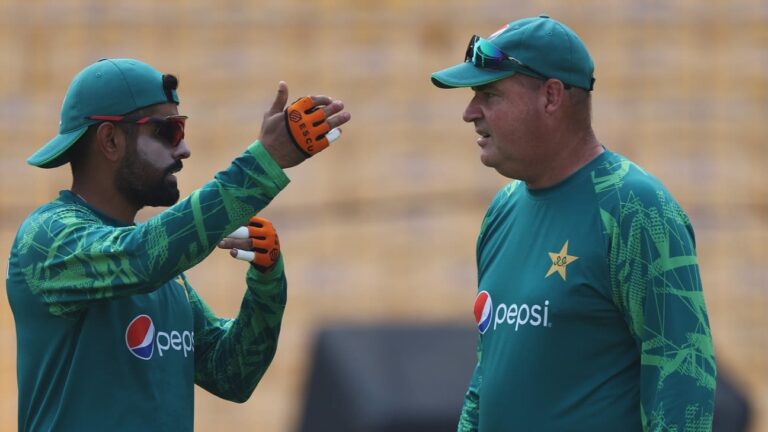
Pakistan finished with five defeats in nine matches and had struggled until the middle of the league stage, losing to India, Australia, Afghanistan and South Africa all in a row. Babar’s form did not live up to expectations, given the extremely high standards he often sets in white-ball cricket. He had an average of 40 and a strike rate of 82.9, reaching five fifties and earning a high score of 74.
As a result, Babar’s captaincy has come under significant scrutiny at home. He had been the highest-ranked ODI batsman, and Pakistan had been the highest-ranked ODI team in September. But poor campaigns in both the Asian Cup and the World Cup have changed the perspective on his leadership.
“I support Babar, he’s very, very close to me,” Arthur said after the loss to England. “He’s a young man to take on the journey with. He needs to be taught the ropes. He’s still learning all the time. We know he’s a very, very good batsman. He’s learning every day with his captaincy.”
Babar has held the ODI reins for over three years and, at 29, has played international cricket for over eight years.
“He’s growing and we have to give him time to grow,” Arthur said. “And to do that, you make mistakes. It’s not a crime to make mistakes as long as you learn from those mistakes and, as a group, we have made a lot of mistakes in this World Cup. But if this group grows and learns from it, we have the core of a very, very good team.
As for what went wrong for Pakistan in this campaign, Arthur made two important observations. The first was that Pakistan only looked like the kind of team that can score a really big score (as teams like India, South Africa and Australia often do) when Fakhar Zaman plays a lot of innings.
“As for batting, we have to become a 330-350 team,” he said. “The teams that do that and do it consistently are the teams that are in the semi-finals. And I don’t think we’ve done it consistently enough. We do it when Fakhar Zaman goes out and we can’t just depend on the player one on one.”
The second observation was about bowling. Naseem Shah’s absence, forced by injury, Arthur said, unbalanced Pakistan’s attack. Among those considered to have underperformed in this campaign for Pakistan is Haris Rauf, who took 16 wickets at 33.31, but scored 6.74 an over.
“The only thing we know is that Haris Rauf usually doesn’t bowl with the new ball. When you lose Naseem Shah, you have to find someone who can bowl with a new ball. We have been working hard on him with a new ball., and he played well at times, but when he plays with an older ball, that’s what he’s used to.
“It’s not an excuse. Our bowling balance was off because Naseem Shah provides the consistency that allows Shaheen Shah [Afridi] to attack, and then you can attack with your leggings and you attack with Haris Rauf. “So the balance was broken, but that’s no excuse because, frankly, we haven’t played well enough.”
Andrew Fidel Fernando is an editor at ESPNcricinfo. @afidelf